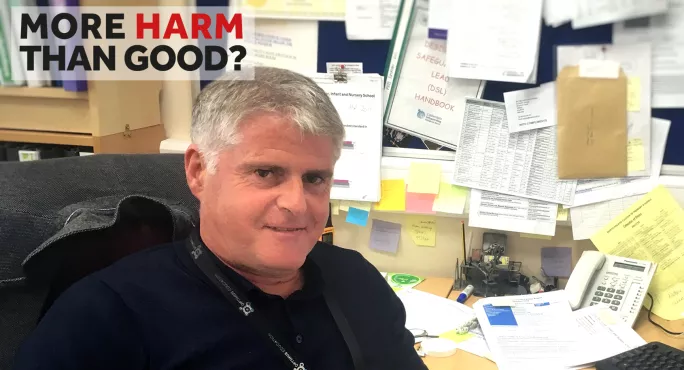- Home
- Achieving an Ofsted ‘good’ in a deprived area was ‘brutal’
Achieving an Ofsted ‘good’ in a deprived area was ‘brutal’

A recurring charge made against Ofsted is that it is more difficult for schools serving deprived communities to be judged to good than those with more affluent intakes.
The NAHT heads’ union accountability commission report published this week will warn that school leaders see leading a school which may be downgraded by Ofsted as a personal high-stakes risk likely to have a long-lasting impact on their career.
Phil Simpson is a headteacher who has led a school in a deprived area to an Ofsted rating of “good”.
But he describes the inspection he had to get through in order to achieve this as “brutal.”
Ling Bob Junior and Infant School serves a disadvantaged area of Halifax, West Yorkshire. Mr Simpson says that all of his pupils arrive in Reception below the level expected for the age group and 80 per cent of them are significantly below.
Unemployment, crime and illiteracy all add to the community’s problems. In 2016, the school was rated as “good” but saw its Sats results drop because of the numbers failing to get to the expected standard in English.
So when Ofsted came again the school was told it would be a two-day inspection.
Mr Simpson says: “The Ofsted handbook says that good schools can be given a two-day inspection when Ofsted’s risk assessment process indicates that the quality of provision may have deteriorated significantly.
“The inspectors didn’t tell us what aspect of the provision Ofsted thought had declined but it can only have been the data.
“The data they had was from 2016 and it was the first time writing at key stage two had been assessed that way. We had 23 per cent of pupils who achieved the expected standard in reading, writing and maths but reading and maths was much higher.
“The feeling I got was that they were looking for ‘requires improvement’ and we had to battle to prove that we were ‘good’.
“It was a really brutal inspection. I am not complaining but it did feel like the inspection was being done to us.
“An inspection like this can feel intimidating and you have to be able to stand up for yourself.”
Mr Simpson believes it is harder for schools in deprived settings to be rated as ‘good’ or ‘outstanding’.
He highlighted the way Ofsted looked at the ability of early years children as an example.
“They looked at the number of children in Reception reaching good levels of development,” Mr Simpson said.
“At our school, 57 per cent of children achieved this and that was up from 34 per cent three years ago. But our lead inspector said to me, ‘This means 43 per cent of children are not ready for Year 1 - is that good?’
“I felt like our early years provision should have been a shoo-in to be ‘good’ if not ‘outstanding’. One-hundred per cent of our pupils are below the expected standard when they join our school and 80 per cent are significantly below.”
His school retained its “good” status. But one of the areas of improvement that Ofsted has called for is for the proportion of pupils in early years getting to a good level of development to increase quickly “to at least the national average”.
Mr Simpson says he does not have low expectations for his pupils. But he questions whether this can be achieved.
“This year 63 per cent of our Reception have achieved this but we would need to put on another seven per cent to be at the national average. I would think this target is close to impossible for us to achieve with our intake.
“Ofsted shouldn’t inspect all schools with one yardstick. They should do more to take a school’s context into account.
“We have 21 children with EHCP plans. The social problems that some of our families have aren’t taken into account. We help families here with form filling because some are illiterate, we run courses helping people to parent their children, how to wash and feed them and when they should go to bed.”
Mr Simpson says he is pleased with the outcome of the Ofsted inspection and proud of it “because they left no stone unturned”. “They got it right,” he adds.
But he remains unhappy about the way the inspection system treats schools serving the most disadvantaged areas.
“One of my bugbears is that teachers and school leaders have got Ofsted on our minds all the time and yet this is an organisation that will come to see you once every four years.
“In disadvantaged schools, you are always going to feel more vulnerable to the accountability system because of the volatility of results.”
Keep reading for just £1 per month
You've reached your limit of free articles this month. Subscribe for £1 per month for three months and get:
- Unlimited access to all Tes magazine content
- Exclusive subscriber-only stories
- Award-winning email newsletters



